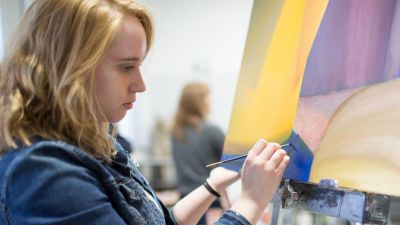
B.A. B.F.A. Graphic Design
Graphic design is one of the most versatile and marketable art fields you can choose to study. By creating an avenue for you to learn to effectively communicate in a visual medium, a major in graphic design prepares you to work in
- illustration,
- studio practice,
- marketing,
- video production and
- many other media-based careers.
As a graphic design major at Concordia University, Nebraska, you will be equipped to analyze problems and create solutions using image, type and web-based strategies. Through a sequence of studio and design courses that introduce a range of materials and working procedures, you will learn how to organize the flow of communication from classroom to client and into society. Concordia’s graphic design program provides the educational framework, experiential training and professional preparedness necessary to compete in today’s market.
Credit hours listed above are the minimum required for graduation. Specific program credit hours may vary.
Use technical skills, creative problem solving and collaborative teamwork to create stunning visuals!
Program Highlights
WHY STUDY GRAPHIC DESIGN AT CONCORDIA?
The graphic design program at Concordia University, Nebraska equips students with an understanding of visual design principles and technical skills based on a foundation of graphic design theory in order to prepare students to articulate their own vision and voice through graphic design.
Learn more about art at Concordia.
Art Club
Art Club is a student-led group that provides an opportunity for students to come together in a community outside of the classroom setting to engage in conversation on different ideas happening in art.
MEET OUR EXPERT FACULTY
As experts in graphic design our faculty and instructors bring years of experience to the classroom.
Meet our students
“Concordia University, Nebraska provides a sound foundation for students with its unwavering commitment to men and women who strive for excellence in their work and life. As a graphic design major I have had the opportunity to work in both print and digital media, gaining a broad knowledge of industry practices. Concordia has offered me a superb education to apply to my professional life and a community I will always be grateful for.”
Sam Sisco
David City, Nebraska
Accreditation
Concordia University, Nebraska is accredited by the Higher Learning Commission, a regional accreditation agency recognized by the U.S. Department of Education.
Degree Goals
A graphic design program graduate from Concordia University, Nebraska will be able to:
- Explore the elements and principles of composition, systems of organization and the exploration of two–dimensional
- Analyze the interaction between visual subject matter, form and content.
- Capture, digitize and edit images with an emphasis on meeting aesthetic and technical requirements of the graphic design industry.
- Combine creative development of ideas, effective communication and correct technical reproduction of the graphic design process with the study of historic and contemporary movements, designers and innovations in the graphic design/illustration experience.
Art Minors
- Studio Art
- Art History
- Graphic Design
- Self-Directed
Career Outcomes
Art Director
- Set the artistic tone of projects, using visuals to bring concepts to life for websites, magazines, ad campaigns, tv or film, photo shoots and video games
- Direct a team of designers, critique work, create deadlines and budgets and inspire your team to produce the best possible visual art
Graphic Designer
- Work with clients or art directors to determine the specifications of a project, conceptualize a design and create visual elements to support a brand
- Work on digital or print materials or both
Web Designer
- Make websites functional and easy to use, but also aesthetically appealing
- Create websites for companies or individuals and keep them updated, functional and beautiful
FAQs
What’s the difference between the B.A. and B.F.A. in graphic design?
Concordia’s bachelor of arts degree in graphic design is designed for students who are looking for a broad-based study of graphic design principles, history and theory. In this program, you will gain an understanding of the aesthetic and technical skills needed to produce innovative design projects. Many students choose to supplement their graphic design classes with electives in the arts or other fields.
The bachelor of fine arts in graphic design degree concentrates more rigorously on graphic design. Your courses will emphasize theory and professional practice, including typography, form and image and interactive design. Electives in the B.F.A. program have an art focus. The B.F.A. is a more focused program and is designed as preparation for entry into professional design practice after graduation or entering a graduate degree program. You’ll also have the opportunity to show your art in a senior the Marxhausen Gallery of Art.
By working with your advisor to examine your career goals, you can determine which graphic design program is the right fit for you.
What kind of courses will I take in the graphic design program at Concordia Nebraska?
At Concordia, you’ll start with foundational classes in graphic design such as
- Digital imaging,
- Visual studies,
- Graphic design history and practice
to provide you with the critical and theoretical tools necessary to function as an art professional.
As you move to more advanced art courses, you’ll dive into more specific classes in
- Video production,
- Typography,
- Interactive design
- And more
to deepen your knowledge and mastery of graphic design principles.
How will Concordia University, Nebraska help me get hands-on graphic design experience?
Graphic design students at Concordia have access to a state-of-the-art Mac computer lab with color sync program. The lab is used for classes, many of which focus on experiential learning, but can also be used for homework or individual design practice.
Outside the classroom, Concordia's Lillich Design Studio for advanced graphic design majors matches students with clients in a collaborative workspace that combines theoretical graphic design solutions for real-world needs. You will be able to put your graphic design skills to work for real clients in the community.
Graphic design students also have the opportunity to show their art at the Red Path Gallery for Art in Seward, which allows students and the community to showcase, critique and collaborate on art projects, and in the Marxhausen Gallery of Art on Concordia’s campus.
Related Programs

Art Education
A degree in art education from Concordia University, Nebraska gives you a broad range of skills with studio- and design-based courses that provide models for both learning and leading in a classroom. Coupled with course work in art history, you will gain exposure to a variety of media, technology and art methods, all of which prepare you to be an art educator in a classroom or any number of other settings.

Studio Art
A degree in studio art from Concordia University, Nebraska is a degree in critical thinking, visual and spatial reasoning and creative problem solving. Through a sequence of studio and design courses, you will be introduced to a wide range of materials and procedures from basic two- and three-dimensional media to multi-disciplinary experimentation. Through historical and theoretical content, you can engage with art’s critical discourse. Here, you can make connections across disciplines and learn how to use visual language to express your ideas, make social commentary, effect change and celebrate beauty. A studio art degree from Concordia Nebraska will help you not only achieve personal fulfillment through creative expression, but also give you the framework to be a professional within the art field.

Marketing
A bachelor of science degree in marketing from Concordia University, Nebraska will equip you with knowledge and skills covering a comprehensive set of marketing concepts and practices.

Computer Science
Concordia University, Nebraska’s computer science program is designed to help you meet current and future challenges in technology- and application-related fields. Here, you can gain a strong fundamental foundation with an emphasis on practical functions of theoretical concepts.
Apply Request Info Information Sessions
1 Recent graduates attending graduate school or employed within six months of graduation.
2Average Class Size for Representative Subject Most Aligned with Major, Over Last 5 Years.